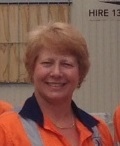In this episode we focus on mentally healthy workplaces. We spend so much of our lives at work and no matter whether you're a farmer, teacher, nurse, firefighter or office worker, we can all find ourselves in stressful environments. So how do we create mentally healthy workplaces and why is this important? We explore this issue in episode three.
 Nick Avanitis currently manages the Workplace Research & Resources in the Workplace Program at beyondblue. His responsibilities include the development and review of beyondblue’s workplace resources (including the Heads Up website), the evaluation of the Heads Up initiative and the delivery of beyondblue’s programs; targeting police and emergency services, health services and small business.
Nick Avanitis currently manages the Workplace Research & Resources in the Workplace Program at beyondblue. His responsibilities include the development and review of beyondblue’s workplace resources (including the Heads Up website), the evaluation of the Heads Up initiative and the delivery of beyondblue’s programs; targeting police and emergency services, health services and small business.
Nick worked as the project manager for the National Mental Health Commission to establish the Mentally Healthy Workplace Alliance. Prior to his current role Nick managed a team in the Victorian Department of Health focusing on the development of Victoria’s mental health workforce. His educational qualifications are in Science and Law.
 Carolyn Kelso has worked for MATES in Construction (NSW) since January 2013 as Case Manager/Field Officer. In her dual role Carolyn delivers training on construction sites (General Awareness Training, Connector and ASIST) and has case managed hundreds of individuals, with many suicide interventions or assistance when workers have hit ‘rock bottom.’ She has completed a Diploma in Community Services and a Bachelor of Social Sciences. Carolyn has worked in many industries and more recently, in welfare both in a professional and voluntary capacity with at-risk children and people with a disability. She is passionate about making a difference for individuals and their communities through education on suicide prevention and supporting people at risk. She believes this is achievable through establishing good relationships and especially with people at the ‘coalface’.
Carolyn Kelso has worked for MATES in Construction (NSW) since January 2013 as Case Manager/Field Officer. In her dual role Carolyn delivers training on construction sites (General Awareness Training, Connector and ASIST) and has case managed hundreds of individuals, with many suicide interventions or assistance when workers have hit ‘rock bottom.’ She has completed a Diploma in Community Services and a Bachelor of Social Sciences. Carolyn has worked in many industries and more recently, in welfare both in a professional and voluntary capacity with at-risk children and people with a disability. She is passionate about making a difference for individuals and their communities through education on suicide prevention and supporting people at risk. She believes this is achievable through establishing good relationships and especially with people at the ‘coalface’.

Yvette McKenzie grew up on a family farm at Merriwagga. She now works as an animal health consultant with Spencer & Bennett/Yenda Producers Co-op in Griffith and is heavily involved with country shows. Working in this environment, she is well aware of the stress placed on farmers. Yvette completed a Workplace Support Skills training (WSS), (RAMHP training course) organised by Australian Livestock and Property Association (ALPA).
Mentally Healthy Workplaces
According to SANE Australia, ‘Mental illness is the leading cause of long-term workplace absence in most developed countries. Mental illness is also associated with high levels of presenteeism, where an employee remains at work despite symptoms that contribute to lower productivity. Addressing this issue is a major economic as well as health and personal matter therefore.’
Every year, around one in five of the population is suffering from symptoms of mental illness, most commonly Depression and Anxiety, but also including Bipolar disorder and psychotic disorders such as Schizophrenia.
A further one-sixth of the population will be suffering from symptoms associated with mental ill -health, such as worry, sleep problems and fatigue. While not meeting criteria for a diagnosed mental illness, this will still affect their ability to function at work which in turn impacts costs to individuals, businesses, the economy and society in general.
With forty five percent of Australians experiencing a mental health problem in their lifetime, it is likely that at some point, every worker will be affected by mental illness, either directly or indirectly.
While businesses can have the best intentions, if their managers and employees are not equipped to respond to an emerging mental health issue, the end result can be costly both to individual lives and the business bottom line.
RAMHP Training
Do you come across distressed people in the community or at work?
Want to know more about how, where and when to find help for mental health concerns?
RAMHP provide education and training to individuals, communities and service providers aimed at supporting and linking community members to mental health support.
Explore our training options here.
As experienced mental health trainers, RAMHP Coordinators also provide tailored mental health education sessions in response to local needs.
Workplace Mental Health Programs
Whether it’s a cafe on the north coast, or a farm in the west, a mentally healthy workplace is where everyone feels supported, accepted and empowered at work. They are productive, great places to work. The NSW Government has launched an online regional resource kit with tailored advice and resources for regional businesses to promote, manage and support mental health at work. The kit outlines factors that impact workplace wellbeing in regional NSW. For example, separating work and home life, labour shortages, seasonal work and traumatic events. The kit has simple actions for business owners and leaders to create a mentally healthy workplace no matter the region, size or industry.
Learn how to make a difference in your business, and your community at www.mentalhealthatwork.nsw.gov.au
https://www.headsup.org.au/ is a resource developed by beyondblue and the Mentally Healthy Workplace Alliance. On this site, you can work through the online tools to get guidance on what you can to improve mental health in your workplace. You can log on from the perspective of an Employer, Employee, Manager or Small Business Owner.
Way Ahead, Mental Health Association has a workplace health program, for any organisations interesting in improving the health and wellbeing of their employees. They provide network meetings, with expert guest speakers to provide best practice information, newsletter, and a resources section.
Mates in Construction is a charity established in 2008 to reduce the high level of suicide among Australian construction workers. This organisation fosters ownership and control of the program with the Australian building and construction industry. The MATES in Construction program is based on the simple idea that “suicide is everyone’s business” and that if the building and construction industry in Australia is to improve the mental health and wellbeing of workers and to reduce suicide then it cannot be left to the mental health professionals, but rather, everyone in the industry must play their part.
Help services
If you or someone else is in immediate danger, call 000 or go to your nearest hospital emergency department.
If you’re concerned about your own or someone else’s mental health, you can call the NSW Mental Health Line 1800 011 511 for advice.
Having a tough time and need someone to talk to right now? The following services can help you. They are confidential and available 24/7.
- Lifeline – 13 11 14
- Men’s Line Australia– 1300 78 99 78
- Kids Help Line – counselling and support provided for young people (to 24 years old) who are feeling depressed, sad, or lonely – or just need someone to talk to – 1800 55 1800
- Domestic Violence Line – 1800 656 463
- Suicide Call Back Service– 1300 659 467
